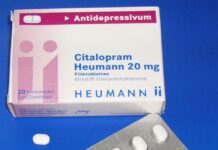How Grief Became a Disorder and What This Means About Us: An Interview with...
MIA’s Zenobia Morrill interviews psychologist Kaori Wada about what the creation of Prolonged Grief Disorder reveals about our culture and the current status of psychology.
MDMA Assisted Psychotherapy and Therapeutic Humility: An Interview with Marcela Ot’alora
Richard Sears interviews Marcella Ot’alora, therapist and principal investigator for MAPS MDMA-assisted psychotherapy.
Suicide Hotlines and the Impact of Non-Consensual Interventions
Those struggling with suicidal thoughts may stay silent instead of reaching out to suicide hotlines because they fear non-consensual intervention and the harmful impact of police involvement.
Robert Whitaker Answers Reader Questions on Pharma Marketing and Psychiatric Drugs
In Part 2 of our reader Q&A podcast, MIA founder Robert Whitaker answers questions on pharmaceutical marketing and issues with psychiatric treatments including psychiatric drugs and electroconvulsive therapy.
In Andrew’s Honor: Attorney Elizabeth Rich’s Fight Against Unjust Commitments
Anyone detained and then formally committed under Wisconsin’s civil mental health laws can initially be held and forcibly drugged for six long months. Yet, for years, not a single person has been able to appeal the six-month commitments in court.
Chris Bullard—The Sound Mind Live Festival
Chris Bullard is the executive-director of the Sound Mind Live Festival which uses music as a connective force to bring people together to help address mental health stigma.
Books Under Review: Spring 2022
Reviews of four recent books reflecting various perspectives on the mental health system.
Is Service-User Research Possible in Mental Health? An Interview with Diana Rose
MIA’s Ayurdhi Dhar interviews Diana Rose about producing knowledge with survivors of psychiatry, abuses faced by service users, and what good research would look like.
Interview: Researchers Deconstruct Ghostwritten Industry Trial for Antidepressant
Researchers, Jon Jureidini, Jay Amsterdam and Leemon McHenry, have taken a closer look at the data from a randomized control trial of citalopram (Celexa) that was ghostwritten and then used by the manufacturers to support claims of the drug’s efficacy and safety in the treatment of child and adolescent depression. To get the background on this story, we connected with Dr. Leemon McHenry, an investigator in this study and a lecturer in philosophy at California State University, Northridge.
The Media Scolds Marianne Williamson (And Gets It Wrong)
Journalists have called Marianne Williams’ comments on depression dangerous and irresponsible. A closer look reveals that her “opinions” on mental health treatment are more in line with the science, and that the know-it-all assertions by Cooper and colleagues are belied by it.
Screening + Drug Treatment = Increase in Veteran Suicides
For the past 15 years, the VA's suicide prevention efforts have focused on getting veterans screened and treated for psychiatric disorders, with antidepressants a first-line therapy. This effort has caused veteran suicide rates to steadily rise.
Trans Lifeline: Naming Trans-Specific Harm in Mental Health
Interim Hotline Manager Jahmil Roberts and Advocacy Director Yana Calou from the Trans Lifeline work towards connecting trans people to the community support and resources they need to survive and thrive - free of prisons and police
Beyond Labels and Meds—Closer Look: Isabella Castillo
At times I tend to feel invisible. Sometimes I don’t feel like I fit in with everyone else; I feel like an outsider.
Teen Arts Exhibition: Beyond Labels And Meds: What It Feels Like To Be Me
28 teen artists share the power of their creativity in this collection of profoundly moving, courageous, and beautiful artwork.
For Life: Opera on Psychiatry and Its Drugs
An interview with composer Dawn Sonntag and librettist Kermit Cole about their new opera about the harms that can come from psychiatric drugs.
Popular Obesity Drugs Monitored for Suicidal Thinking
Concerns rise about the adverse effects and longer-term harms of GLP-1 injections like Ozempic and Wegovy.
Veterans Find A Path to Healing Through Shakespeare
Veterans struggling with a diagnosis of PTSD, or depression and other difficulties find that learning to perform Shakespearean monologues, and developing their own dramatic monologues, can help them "unwire" from the traumas of war.
David Carmichael—The Antidepressant Safety Tour
Drug safety advocate David Carmichael joins us to discuss his upcoming antidepressant safety tour and the importance of fully informed consent when prescribing SSRI antidepressants.
Undisclosed Financial Conflicts of Interest in the DSM-5: An Interview with Lisa Cosgrove and...
On the Mad in America podcast we talk with Lisa Cosgrove and Brian Piper about their BMJ paper entitled "Undisclosed Financial Conflicts of Interest in the DSM-5 TR: Cross-Sectional Analysis"
Laura Van Tosh: The Life of a Psychiatric Survivor Activist
Laura Van Tosh has been a leader in psychiatric survivor circles for 40 years, working at local, state and national levels.
Renee Schuls-Jacobson – Psychiatrized: Waking up After a Decade of Bad Medicine
We interview Renee Schuls-Jacobson about her book Psychiatrized: Waking up After a Decade of Bad Medicine which details Renee's experiences being prescribed the benzodiazepine clonazepam (Klonopin) for seven years.
Britney Speaks: Are We Ready to Listen?
Comparing her circumstances to sex trafficking, Britney Spears told the judge she wished to sue her conservators and be allowed to tell reporters “what they did to me.”
Inside a Forensic Psychiatry Unit: Calling in AIR Strikes
I was not going to earn my release the “traditional” way through unquestioning obedience to the treatment team and ADMIN. I was either going to die in there or find a non-traditional path to my freedom.
Exploring Psychiatry’s “Black Hole”: The International Institute on Psychiatric Drug Withdrawal
When Carina Håkansson sent out an invitation for a symposium on "Pharmaceuticals: Risks and Alternatives," some of the world's top scientists, along with experts-by-experience, came from 13 countries to explore better ways to respond to people in crisis.
Interview: Abuse and Neglect at Private “Troubled Teen” Centers
Parents, beware: Disability rights lawyer Diane Smith Howard shares disturbing findings on conditions at youth residential treatment facilities.

































